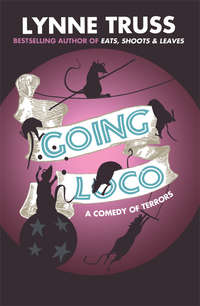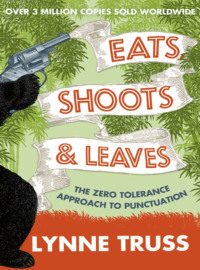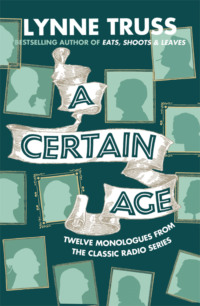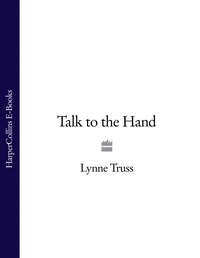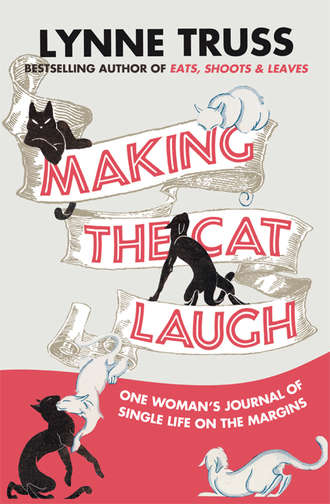
Полная версия
Making the Cat Laugh
Reports of Mr Bobbitt’s operation tell us it was only partially successful. In other words, it is not the willy that it used to be. Enough said, I think. Much attention Stateside has focused on the advisability of women taking the law into their own hands, and on the disturbing idea that here, in the Bobbitt emasculation, is the most terrifying of all female revenges. But of course it isn’t, not by a long measure. A proper job would involve detailed pre-planning, and in particular the planting of a look-alike willy on a main road (a stand-in!), possibly next to a large sign with ‘I think this is what you’re looking for, officer’ written in large letters upon it. In the sweetest of all possible revenges, Mr Bobbitt would therefore emerge from his anaesthetic and say, ‘Funny, doesn’t look like mine,’ but cast such doubt immediately from his thoughts, as impossibly far-fetched.
Tattooed serial numbers would seem to be the answer, if any man is worried. But I doubt Mrs Bobbitt with her kitchen knife has started a trend, or anything. Most women are rightly repulsed by the idea of mutilation; if there is a nasty cackle of joy among certain feminists at the Bobbitt news, it’s just that there is something irresistibly hilarious at the idea of standing between a man and his willy, for however brief a span. I just hope the Hollywood Bobbitt films have thought of the Orlac angle. It would be a shame not to grab it up, rush it to the studios, and stitch it on sharpish. After all, it wouldn’t even matter if it didn’t quite fit.
‘Bob Dylan has been spotted looking at property in Crouch End …’ Scene: The well-furnished drawing-room of a large house in Crouch End, north London, one afternoon in August. Birds twitter in the garden beyond; a doorbell rings; a dog barks. From the hallway, a small shriek of surprise is followed by low murmurings of welcome. The door to the drawing-room opens briefly and an estate agent is heard to say, ‘Upstairs first, I think,’ before a woman, evidently distraught, rushes in, slams the door and grabs the telephone. She dials and waits, screwing up her face and tap-dancing on the parquet in anguish and impatience. Finally her call is answered by a man with a German accent.
WOMAN: Doctor Fiegelman? Thank God you’re there. It’s happening again.
DR FIEGELMAN (on phone): Go on.
WOMAN (with strangled cry): It’s Bob Dylan, doctor. He wants to buy the house.
DR F: Mein Gott, this is serious. Are you sitting down?
WOMAN: No.
DR F: I think you should sit down.
The woman miserably slides down the wall until she is sitting on the floor.
WOMAN (whispering): Done it.
DR F: Good. Now, taking your time, what exactly is it that makes you think Bob Dylan wants to buy your house in Crouch End?
WOMAN: The fact that he is currently upstairs with an estate agent investigating the airing cupboard!
DR F: I see. And when did this start?
WOMAN: The minute I opened the door.
DR F: Mm.
WOMAN: You’ve got to help me, doctor.
DR F: And I shall. But I thought we finished with all this after Al Pacino bought that old cooker-hood you advertised in Loot?
WOMAN (faintly): So did I.
DR F: I mean, Elizabeth Taylor never turned up for the hairdrier, did she?
WOMAN: No. Not after we worked on it for two months, five days a week, at £75 a go.
DR F: And you realized, in the end, that it wasn’t Warren Beatty who bought the pram?
WOMAN: It was – um, David Essex?
DR F: That’s right. Not Warren Beatty, but David Essex. That’s very good. You’ve been doing the breathing exercises?
WOMAN: Every day.
DR F: And how big is this Bob Dylan?
WOMAN: Quite small.
DR F: Thank God for that, at any rate.
Suddenly the door opens, and BOB DYLAN enters the room, carrying a tape-measure and wearing a puzzled expression. The WOMAN whispers hoarsely into the phone, ‘I’ll call you back,’ and hangs up. She scrambles to her feet, looking guilty.
WOMAN (nervously): Ha ha.
DYLAN smiles politely, strolls to the french window, looks at the view, shrugs, mumbles something appreciative, and exits. The WOMAN points wordlessly at his departing back, and then faints on the hearth-rug. Black-out, curtain.
Scene: The same, an hour later. MAN with briefcase, evidently returning from work, enters to find wife lying insensate on the best Persian. Thinking quickly, he hurls his briefcase at her recumbent form, and it bounces off her head.
MAN: Darling, speak to me!
WOMAN (rubbing her bonce, indicating the briefcase): Why did you do that?
MAN: I didn’t have a glass of water.
WOMAN: I see.
MAN: Why are you on the carpet? Not another of your delusions, poppet?
The WOMAN nods, reluctantly.
MAN (sympathetically): Not Michael Jackson offering to spay the cat again?
WOMAN: No. Bob Dylan, wanting to buy the house, for £310,000.
The MAN whistles through his teeth.
MAN: £310,000? Well that’s something. Good heavens, £310,000, it might almost cover the therapy. I mean, what did we get for the cooker-hood?
WOMAN: Five pounds. But –
MAN: I think we should go for it.
The doorbell rings. The MAN prepares to answer it. He re-enters, dumbfounded, with ELIZABETH TAYLOR at his side.
MISS TAYLOR (for it is she): Sorry I’m late, I’ve come to collect the hairdrier.
As the curtain falls, the WOMAN collapses into her husband’s arms, and ROBERT DE NIRO enters whistling with a bucket and ladder, asking to use the tap. End.

The front-page headline of last Thursday’s East London Advertiser was rather alarming, especially for the sort of neurotic pet-owner who periodically grabs her cat by the shoulders and searches its furry, inscrutable face, saying with a choked voice, ‘You’ve got to tell me something. If I died, would you eat me?’
‘DEAD MAN “EATEN” IN GRUESOME CAT HORROR’ screamed the headline, thereby putting an end to all speculation. Of course I hoped it was a sensational joke – along the lines of the Weekly World News: ‘Bat With Human Face Found (He’s Smart As A Whip, Says Expert)’ – but I knew in my heart it was serious. Evidently, this poor chap in Shadwell died of a heart attack, and in the ensuing week his thirty cats – starving hungry, but with no money for Whiskas, and anyway congenitally hopeless with a tin-opener – perpetrated the gruesome cat horror which involved him being ‘eaten’. It doesn’t bear thinking about. Apparently he loved those cats. He thought they loved him back. So far as I could see, the only positive aspect to the story was that he was ‘eaten’ only in inverted commas.
I don’t usually see the East London Advertiser, but a kind friend sent me the cutting, thinking I ought to know. Possibly she recalled that my latest effort to tighten the bond with my own cats entails entertaining them each morning with spirited impersonations of the animals they are about to eat, which suddenly smacks of insane recklessness, given the Shadwell experience. ‘Now, what have we got here?’ I say excitedly, examining the tin. They give me a weary ironical look that says, ‘Go on, surprise us.’ ‘Rabbit!’ I raise the tin-opener, and their ears prick up, so I put it down again and they scan the ceiling for flies. ‘A rabbit goes like this,’ I say, assuming the goofy-teeth thing, and waggling my hands on top of my head, in semblance of floppy ears. They look at each other in despair. ‘How’s she going to do liver, that’s what I’d like to know?’
(Incidentally, sorry to interrupt the flow, but for anyone thinking of adopting this pleasurable and essentially harmless daily routine, here are some tips. First, it is hard to imitate salmon unless you have a fairly high ceiling, for the leaping upstream. Kidneys and liver are indeed virtually impossible to impersonate, and should therefore be eliminated at the shopping-trolley stage. For high-class meals involving crab, one needs an energetic sideways scuttle, so clear all furniture first. The turkey impression comes to life splendidly if you can be bothered to tie empty red balloons to the sides of your head. Beef, lamb and duck are a doddle, obviously. And finally, a word of warning: if you find yourself trying to impersonate a chunk per se, you may have let things get out of hand.)
Anyway, in my initial alarm at this story, I kept thinking of that famous scene in Charlie Chaplin: the snow-bound cabin, the two companions ravenous, and the fat man with the heavy eye-liner hallucinating that the little fellow is a chicken. How ghastly to think this is happening in my own home – and not just when I am selflessly attempting to enliven mealtimes with a spot of one-sided Old MacDonald charades. When they watch me trotting to the shed, those cats just see a huge tin of Whiskas on legs. When I’m asleep, they see a huge tin of Whiskas, with legs, lying on its side.
But the interesting thing about the Shadwell story was the line, ‘The RSPCA had been called in, to destroy the cats.’ What? Destroyed? Why on earth would you do that? Suddenly all my sympathies swung the other way. These cats should be counselled for post-traumatic stress. It is a well-observed fact that in extremis human beings will cannibalize each other; and we don’t generally hand the bewildered survivors to a humane vet afterwards. These cats needed food, there was nothing depraved about it. Imagine you were locked in a Kellogg’s warehouse, and helped yourself to a few Rice Krispies to keep yourself alive. At the end of the week, the police burst in, and you say, ‘Thank God you’ve come, there’s not a drop of milk in this place, can you believe that?’ But they survey the scene – snap, crackle and pop all over the place – and shrink back, screaming. ‘CEREALS “EATEN” IN GRUESOME VEGETARIAN HORROR’ runs the headline in next week’s paper, and you are peremptorily taken out and shot.
The Single Woman Considers Going Out but Doesn’t Fancy the Hassle
I have been toying with an idea for a short story. It’s a variation on the film Thelma and Louise, in which a third, previously overlooked woman character (let’s call her Abigail) gets a phone call from Louise. ‘Git yer bags, honey, me and Thelma we’re headin’ fer the mountens.’ ‘Count me in,’ yells the feisty Abigail as the soundtrack swells with up-beat jive. She paints her lips, grabs a sweater, pulls on her cowgirl boots, swings through the door and then stops on the porch. Damn. The music ceases abruptly. She puts down her bag and kicks it. Damn again. What has she been thinking of? How can she go? How can she possibly go on a once-in-a-lifetime adventure with Louise and Thelma today – when she’s already started defrosting a chicken?
I intend to call the story ‘The Road More Travelled’, because I feel the majority of women will identify with Abigail the chicken lady. My sorrowful contention, in fact, is that butter it how you will, we are most of us chicken ladies – rationalizing inaction, inventing pathetic reasons not to do things. Why didn’t the chicken lady cross the road? Because she’d just done her toenails, of course. For every Thelma and Louise accelerating a big green Thunderbird into thin air above the Grand Canyon there are at least a million of us pressing our noses to wet wintry windscreens, deciding we can’t possibly take a five-minute detour on the way back from Ikea. ‘Got to get home!’ Why? ‘It’s bins night.’
The trouble with escape, I suppose, is that it must be dramatic and once-and-for-all; anything else is just holidays. For my own part, I have nothing particularly onerous at home to escape from – only newspaper deadlines, a neglected novel, an EastEnders addiction, and a punishing schedule of cats’ tea-times – yet I seem to battle constantly against powerful flight fantasies. I don’t mean drooling over economy fares to Delhi, either. I mean that regularly I drive in circles at Brighton’s orbital roundabouts, defying the lure of the home exit, and torturing myself with such exotic alternatives as ‘Worthing’ and ‘Shoreham’.
Yes, yes, make the break! Turn those wheels, baby! But then I glance at the clock on the dashboard and change my mind. Drat, half-past two, it will be dark in a couple of hours. If you’re going to run away from home, it’s better to hit the road first thing in the morning with a little bag of Marmite sandwiches and a banana. So I take the Brighton turn-off with a familiar mixture of self-loathing and relief, and head back by the usual route. (Today’s unconvincing reason for not escaping: no banana.)
I hope I’m not talking to myself here, by the way. Perhaps some readers never entertain the ‘Ordinary Woman Completely Disappears’ fantasy; never dream of wearing dark glasses at night and crashing through road-blocks on the A27 at Chichester. But surely every woman turns down small adventures in favour of urgent ironing; says ‘Can’t’ when she really means something else. Perhaps we draw the line so quickly on outlandish opportunities because we fear otherwise it may not get drawn at all. Thelma and Louise discover what they’re capable of once they’re free, and it’s pretty alarming.
But back at my short story, I don’t know how it ends. I don’t know what happens to Abigail the chicken lady. In the movie, when Thelma and Louise drive at night through Monument Valley, you get that spooky old Marianne Faithfull song ‘The Eyes of Lucy Jordan’ about the woman who went bonkers because she always stayed home. ‘At the age of 37 / She realized she’d never / Drive through Paris in a sports car / With the warm wind in her hair.’ I have an idea that Abigail has no such regrets. She just continues to defrost the chicken, cooks it, suffers salmonella poisoning and dies – expiring just at the point when Thelma and Louise fly into their ravine. It’s a bit harsh, perhaps. But as Thelma and Louise showed, sometimes you have to be fairly dramatic to make a point.

In the new Penguin Book of British Comic Writing there is a short autobiographical essay by Elizabeth Bowen called ‘On Not Rising to the Occasion’. I recommend it highly, especially if your memory of childhood etiquette disasters is still so vivid it makes you feel like running to the hall and burying your face in an auntie’s funny-smelling coat. Elizabeth Bowen’s childhood was an Edwardian one, so she had proper guidance in suitable behaviour (she probably did not innocently repeat the word ‘git’ in company, as I did), but she still misjudged it sometimes in a very particular way: she ‘overshot the mark’. ‘Thank you, Mrs Robinson, so very, very much for the absolutely wonderful LOVELY party!’ she would say. ‘Well, dear,’ her hostess would reply with a frigid smile, ‘I’m afraid it was hardly so wonderful as all that.’
My own experience of childhood parties was a little different, since I felt awkward in the society of children and generally slipped out during pass-the-parcel to ask Mrs Robinson whether I could help with the washing up – which surprised her, especially if we hadn’t eaten yet. ‘No, you go and have a good time,’ she said, mystified, pushing me out of the kitchen with her leg. Thus, when it came to going-home time, I did not embarrass her with my effusions; I merely cried with relief. ‘Lynne tried to help with the washing up,’ she would inform my older sister, tapping her forehead significantly. ‘Funny,’ said my sister. ‘She doesn’t do that at home.’
But I still managed to overshoot the mark in other ways. At the age of ten, for example, I went to a party where a game of forfeits was played – you know, where you are given a task, and the penalty for failure is to kiss a boy. When my turn came (and I had been led back to the games room by a kind but firm Mrs Robinson, who declined my wild-eyed offer of silver-polishing) I was informed that my task was to recite a poem. A limerick would have easily sufficed. But I was nervous, and desperate not to kiss a boy, so I launched into ‘The Highwayman’, a long, galloping poem which unfortunately galloped off with me clinging on to its back, bouncing and helpless. In fact, I had got as far as ‘Tlot-tlot in the frosty silence!’ before the exasperated kids finally flung themselves bodily in front of my runaway poem, waving their arms, to make me stop.
Overshooting the mark in Elizabeth Bowen’s sense is actually quite difficult these days, now that we have followed America into a more kissy-huggy way of life. Saying merely ‘Thank you for the absolutely wonderful LOVELY party!’ sounds tame, actually; it raises suspicions that you didn’t enjoy it. In 1978, when Woody Allen’s film Interiors came out, I remember that it seemed genuinely peculiar to see women greet each other with ‘Hey! You look great! Your green is perfect!’ while planting smackeroos on one another’s ear-rings. Nobody I knew behaved like that. But now I don’t know anybody who doesn’t. In fact nowadays, if someone neglects to applaud my green, I actually worry about it afterwards.
But what Elizabeth Bowen’s essay brought to my mind most horribly was not the thank-you-for-having-me thing; or even the social smackeroo. What it made me think of most was Selfridges. Because one day, when I was in the basement there, I quite unwittingly overshot the mark, and I still feel embarrassed about it. It happened quite by chance; I had only popped in for some diamanté cat collars. But then I noticed this poor old bloke on a carpet-tiled plinth demonstrating a cordless travel iron, and I’m afraid it was ‘The Highwayman’ all over again.
The trouble was, his little crowd was so unresponsive. ‘Now, you see this?’ he said, without much enthusiasm, producing a bone-dry knotted lump of cotton velvet. Nobody moved, or indeed acknowledged his presence, so I piped up, I couldn’t help it. ‘Gosh,’ I chuckled encouragingly, ‘I wouldn’t want to iron that!’ He gave me a look, then gravely un-knotted the velvet and flourished his little iron over it – to amazing effect. Suddenly the cloth was smooth and lovely! Again, nobody clapped, or even murmured. So I said quite loudly, ‘Well, I think that’s quite remarkable. I’ve never seen anything like it. What an extraordinary device. I only came in for these cat collars and a whole new world has been revealed.’
And I got increasingly voluble, I don’t know why. ‘That’s amazing,’ I said flatly, as his crowd started to wander off. ‘Do that again. Wow, I can’t believe how those creases are coming out.’ I felt I was doing him a useful turn, although I couldn’t help noticing that by the time the demonstration ended I was the only person left. ‘Thank you,’ I said warmly, ‘that was marvellous,’ and went off to pay for the cat collars. And when I looked back, I noticed he was pointing me out to a sales assistant, who was patting him gently on the shoulder.
Only when I got home did I realize I had overshot the mark so badly I had sounded like a ‘plant’, by which time it was too late to apologize. I often wonder how close I got, actually, to being clocked over the bonce with a miracle travel iron. It would have been such a pointless way to go. Whatever the merits of this extraordinary velvet-smoother, it was hardly so wonderful as all that.

One of the more obvious advantages of childlessness is that you never have to do the business with the school hamster. We all know the syndrome: it starts with ‘Can we have Raffles at home this weekend?’ and ends when after forty-eight hours of love and attention – feeding, watering and changing straw – the motley, beady-eyed ingrate suddenly kicks the bucket on Sunday night when all the pet shops are shut. Stiff-legged on the floor of his hutch, the hamster peers through its straw with a great eternal question in its lifeless gaze. It appears to be thinking, ‘Get out of that. You can’t, can you?’
But unfortunately single life does bring its own version of the Death of Raffles routine. Since you tend not to take holidays at peak times (such as the first week in August), you can find yourself cheerfully agreeing to be pet-servicer, plant-waterer and fish-food-sprinkler for such a large number of lucky neighbouring holiday-makers that you would certainly bend under the burden of responsibility if the weight of all the flipping door-keys didn’t stagger you first. Currently my key-ring is so heavy with other people’s Chubbs, Banhams and Ingersolls that I am permanently reminded of the great clanking whatsit dragged around by Marley’s Ghost.
Конец ознакомительного фрагмента.
Текст предоставлен ООО «ЛитРес».
Прочитайте эту книгу целиком, купив полную легальную версию на ЛитРес.
Безопасно оплатить книгу можно банковской картой Visa, MasterCard, Maestro, со счета мобильного телефона, с платежного терминала, в салоне МТС или Связной, через PayPal, WebMoney, Яндекс.Деньги, QIWI Кошелек, бонусными картами или другим удобным Вам способом.


